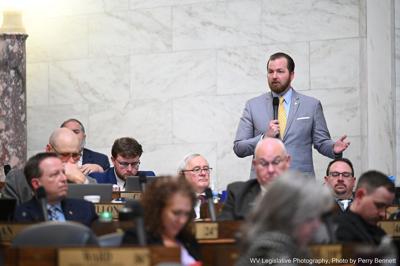The West Virginia House of Delegates passed a bill that would authorize the Public Service Commission to establish rules for the testing and maintenance of fire hydrants owned by water utilities.
Delegatesā approval of House Bill 5617 was one of their final acts on the last day for most bills to advance out of their houses of origin Wednesday evening.
The Houseās 89-2 vote in favor of HB 5617 didnāt reflect what had been a difficult road to passage for the bill. That difficulty was rooted in a split between the billās lead sponsor and the head of the PSC on whether water utilities should be allowed to increase rates to comply with the new standards to be set up through HB 5617.
House Transportation and Infrastructure Committee Chairman Daniel Linville, R-Cabell, HB 5617ās lead sponsor, had argued that utilities already should have been factoring hydrant testing and maintenance into their rates. As advanced by his committee, HB 5617 would have prohibited utilities from increasing rates to meet HB 5617-enabled standards.
But the House Judiciary Committee removed that provision from the bill after PSC Chairman Charlotte Lane objected to it. Lane called it unconstitutional and said it would keep small public service districts from absorbing the costs of fire hydrant upkeep.
Linville and Delegate J.B. Akers, R-Kanawha, had prepared an amendment to be considered on the House floor Wednesday to restore a previously proposed ban on utilities seeking rate recovery covering existing hydrants.
But Linville withdrew the amendment.
āLetās take care of this,ā Linville said in a House floor speech in which he said Sunday was the 11th anniversary of his grandfather dying in a house fire. āLetās take care of this right now.ā
Linville urged his fellow delegates to āscrutinize everything thatās going on withā utilitiesā potential response to HB 5617, which now goes before the Senate.
āI believe those fire hydrants have always had to work,ā Linville said.
PSC staff found hydrant oversight āunacceptableā
HB 5617 follows a PSC staff investigation that found a widespread failure among water utilities throughout the state to inspect, test and maintain fire hydrants.
ā[I]t is an unacceptable situation which must be corrected,ā warned a Public Service Commission staff memorandum filed with the agency.
PSC staff recommended a state-funded and statewide hydrant replacement program for nonprofit water utilities, predicting that smaller utilities couldnāt afford hydrant replacement costs without significant rate hikes. Staff suggested $70 million to support the program.
But Lane told the Transportation and Infrastructure Committee that unidentified opposition to PSC staffās hydrant replacement grant program proposal caused the PSC to take its pro-rate recovery stance. The PSC did not respond to a request to identify that opposition after the meeting.
HB 5617 would allow the PSC to issue rules on inspection and testing of hydrants per National Fire Protection Association and American Water Works Association standards. PSC staff had recommended amending state code governing water utilities to address hydrant inspection and testing, finding that state rules and regulations donāt require annual inspection or periodic flow testing in accordance with national standards.
32% of utilities donāt regularly flow test hydrantsThe PSC staffās fire hydrant investigation followed ĀŅĀ×ÄŚÉä firefighters reporting insufficient flow at three West Virginia American Water hydrants on the West Side during a May house fire that left a dog dead.
Based on responses from 256 water utilities, the PSC staff found only two-thirds of hydrants are inspected every year and stressed that all hydrants should be inspected annually. PSC staff reported 11% of hydrants statewide are older than 50 years, the age at which the staff determined hydrants should be replaced.
Just 68% of utilities regularly flow test hydrants, something staff members said should be performed on all hydrants.
Only 42% of utilities indicated that they have a written procedure for hydrant maintenance, which includes inspection, according to the PSC staff, which noted that āanything less than 100% is not acceptable.ā











